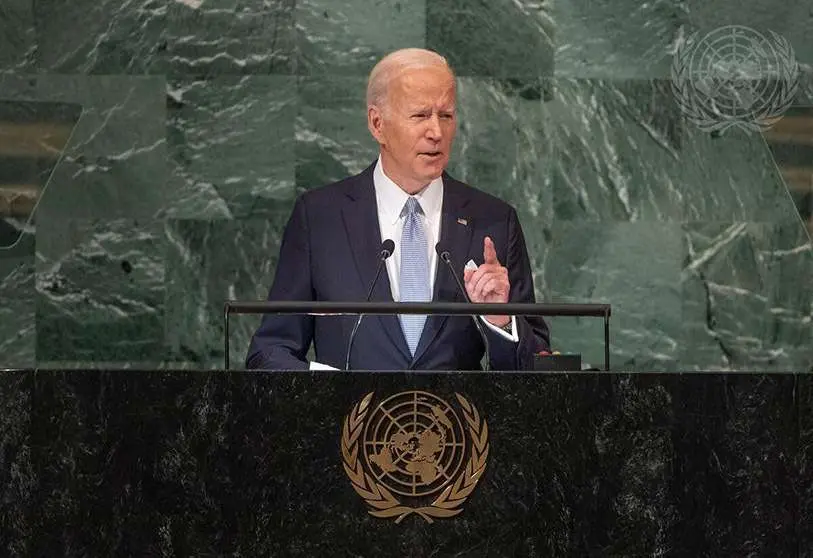Biden warns Putin at UN: "You can't win a nuclear war"

His speech was barely more than 30 minutes long, but Biden had plenty of time to highlight his agenda to the attentive audience of the United Nations General Assembly and tens of thousands of people around the world. Rarely has a speech raised as much expectation as the one delivered on Wednesday by the President of the United States from New York. The global context, of course, was inviting in the wake of Russian leader Vladimir Putin's aggressive reaction to the blowback from his invasion of Ukraine.
"In the last year, our world has undergone a major upheaval," Biden began, alluding to the devastation caused by the COVID-19 pandemic, the war on European soil and its political and economic consequences. The occupant of the White House, however, focused the bulk of his speech on one country: Russia, and one man: Putin, whom he accused of "violating the United Nations Charter" as a result of his "imperialist ambitions".

The "partial" mobilisation of troops and veiled threats about the use of nuclear weapons has provoked a dangerous escalation of the conflict to which the world, in Biden's words, must respond united. Seamless. The Kremlin has lost control of events after the Ukrainian army's successful counter-attack in the north, fighting at the gates of the Lugansk oblast, and its leader issued a speech in which he raised the level of his threats.
"Let's be clear: a member of the UN Security Council has invaded its neighbour, has tried to wipe a sovereign state off the map," Biden emphasised. Today, the Russian president has issued clear nuclear threats against Europe, the Kremlin is organising fake referendums to try to annex parts of Ukraine, and Putin claims he had to act because Russia was threatened, but that's a lie, nobody threatened Russia."
"This war is about erasing Ukraine's right to exist as a state, plain and simple, and Ukraine's right to exist as a people," insisted Biden, who welcomed the economic and arms support provided by his administration so that Ukraine "has the capacity to defend itself". But the US president first made a direct appeal to those member states that have not yet taken a clear position on the conflict: "Whoever you are, wherever you live, whatever you believe, this should make your blood run cold.

"The United States wants this war to end on just terms, on terms that we all signed up to: that you can't take a nation's territory by force," Biden stressed, noting the broad outlines of the UN Charter: freedom, sovereignty and principle. "The only country that stands in the way of that is Russia. "A nuclear war cannot be won, and it must never be fought," Biden said in a message to Putin.
Under the watchful eye of the Kremlin's representatives in the Assembly, the US president remarked that the sanctions "explicitly allow Russia to export food and fertiliser". In doing so, he sought to dismiss the rhetoric amplified by Moscow and its like-minded channels that points to the West for exacerbating the food crisis through sanctions. In this respect, Russia "has no limitations whatsoever", Biden added. "It is Russia's war that is making food insecurity worse, and only Russia can end it.
In his speech, the US president moved from accusations against Russia to one of the themes that has marked his first term in office: the growing rivalry between autocracies and democracies on a global scale. Quoting former President Harry S. Truman, the signatory of the UN Charter that made the United States the first country to complete the ratification process, Biden assured that Washington is determined to protect the democratic model wherever it is needed "to meet the challenges of our age". He acknowledged, however, that it must prove its effectiveness.

After devoting the bulk of his speech to portraying Russia as an international pariah, Biden redoubled his efforts to present the US as the guarantor of human rights, the fight against climate change and the rules-based world order. Back to multilateralism. Calls for financial assistance to mitigate the effects of "floods in Pakistan and drought in the Horn of Africa", direct consequences of the climate crisis, were joined by denunciations of the actions of autocratic regimes.
From the "re-education camps" in the Chinese province of Xinjiang, included in a recent UN report, to the precarious situation of women in the Taliban regime in Afghanistan, where girls can barely go to school, and Iran, where the death in police custody of Mahsa Amini, a 22 year old woman who was questioned by the authorities for not wearing the veil correctly, has sparked a series of protests throughout the country that have resulted in the death of at least five people. Biden reviewed and denounced each and every one of these cases.

He then made it clear that the United States "is not seeking conflict or a cold war". "We are not asking any nation to choose between the United States and other partners", Biden reaffirmed his commitment to the "one China" policy, despite his constant rapprochement with Taiwan, with whom he maintains a strategic ambiguity regarding its defence in the event of a Chinese attack.
He did not show such restraint with Iran, with whom he has been negotiating for more than 17 months the renewal of the nuclear agreement within the framework of the P5+1. The aim is to curb at all costs the Persian nuclear programme, which, according to observers, could be close to atomic weapons. The battery of accusations by Iranian leader Ebrahim Raisi, who addressed the Assembly minutes before Biden, did not bode well, but the US president pledged that Iran "will never acquire a nuclear weapon".
Coordinator America: José Antonio Sierra








